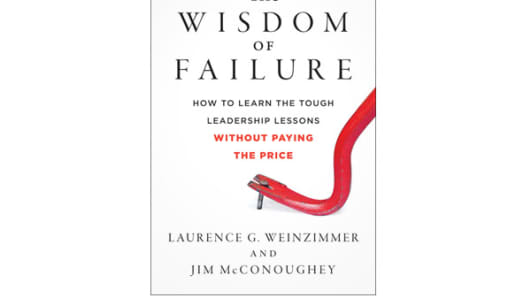GUEST AUTHOR BLOG: The Fallacy of Being Mistake Free by Laurence G. Weinzimmer and Jim McConoughey co-authors of, "The Wisdom of Failure: How to Learn the Tough Leadership Lesson without Paying the Price."
Let's face it. There are two sides to every story: it was the best of times, it was the worst of times; you take the bitter with the sweet; and every rose has its thorn.
But, when it comes to great leadership, we only have half of the story – there is a discernable gap in our fundamental understanding of what it takes to be an effective leader.
Most discussions on effective leadership focus on what leaders "should do" rather than on what they "should avoid."
The result? We talk about success, but seldom talk about failure.
The Duality of Leadership
There are literally dozens of books written about leadership success, books that want us to believe the sky is always blue and the road is always smooth. Unfortunately, they also lull us into a false understanding of what it means to be a great leader. The truth is that great leaders don't always have blue skies or smooth paths. The reality is that we don't—and can't—learn how to be great leaders by just imitating great leaders' accomplishments. It's not that easy. Being a great leader isn't exclusively about making the "right" decisions; often times, it is about how to proactively avoid making the "wrong" decisions. So there is a duality to effective leadership — while there are paths you should follow in order to be an effective leader, there are also paths you should not follow in order to be an effective leader.
In "The Wisdom of Failure: How to Learn the Tough Leadership Lesson without Paying the Price," we discuss a common theme among industry's greatest leaders – their most important lessons have come from trial-and-error. Unfortunately, many of us don't pursue the trial because we are fearful of making error. Jim Owens, former CEO of Caterpillar Inc. , told us that our most important lessons as leaders come from our toughest losses.
The Failure Paradox
While every great leader makes mistakes, it's just as true that there are only a limited number of mistakes you can make before proving yourself an unworthy leader – you can only fall off the corporate ladder so many times before your climb is finished. And the higher you get, the more severe the fall; the more failure becomes unthinkable.
This is where the downward spiral can begin, of "winning" at all costs – even if it means hiding mistakes, blaming subordinates, and even lying. Simply put, at a certain level, failure is not an option. And yet, in order to succeed we need to know failure. This is the failure paradox.
The Fallacy of Being Mistake Free
Mistakes are often the result of taking healthy risk. They provide us with new ways of thinking and give us new insights into how we can improve as leaders. Real failure doesn't come from making mistakes; it comes from avoiding errors at all possible cost, from fear of taking risks to the inability to grow. Being mistake-free is not success—in fact, it's not even possible. Still, we often avoid risks and ignore (and sometimes even hide) our mistakes. We don't like to talk about our mistakes and bring attention to them. It feels safer to look the other way or sweep them under the rug. But doing so stifles growth and dooms us to repeat our mistakes—it's why so many leaders have the same struggles over and over again.
Learning the Tough Leadership Lessons without Paying the Price
We'll all make our own mistakes, true, and hopefully we will learn from them. But the real opportunity comes when we are able to learn from others' mistakes before we are confronted with similar challenges ourselves; we can literally learn the lessons without paying the price. And this perspective is starting to gain significant momentum.
We need to understand what has worked in the past – and why; we also need to understand what has not worked in the past – and why. And we need to learn both through our own direct experience and through clear-sighted analysis of others' failures. While great leaders will still make mistakes, they only make "original" mistakes—they are not doomed to repeat the lessons they've already learned whether directly or indirectly.
About the authors: Laurence G. Weinzimmer is a sought after business advisor to numerous Fortune 100 companies, the Caterpillar Inc. Professor of Management in the Foster College of Business Administration at Bradley University, and author of 3 books including the best seller, Fast Growth.
Jim McConoughey is a private consultant lending his expertise to multiple private and public boards and charitable organizations throughout the region and across the country.
Email me at bullishonbooks@cnbc.com — And follow me on Twitter @BullishonBooks


